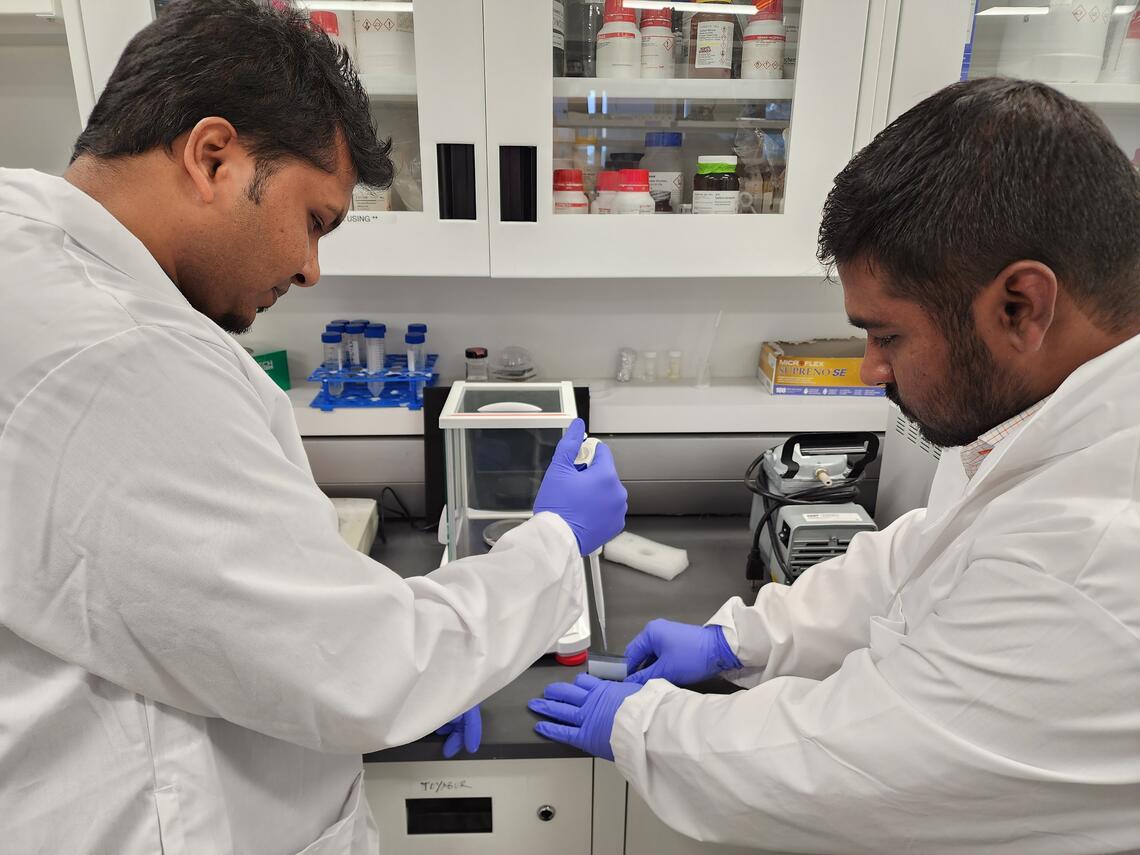Sept. 14, 2023
Schulich researchers power up wearable tech with hydrogel nanocomposite

As the popularity of wearable devices continues to rise, researchers at the University of Calgary are tackling some of the biggest challenges facing the technology.
Chief among them is enhancing self-powered functionality to extend the operational lifetime of the devices — especially as they get smaller — while including more features and applications.
A Schulich School of Engineering team led by Department of Mechanical and Manufacturing Engineering professor Dr. Seonghwan (Sam) Kim, PhD, is developing a wearable hydrogel-based triboelectric nanogenerator — or TENG — that converts mechanical energy into electricity.
“These materials offer a game-changing combination of softness, flexibility, durability and biocompatibility, making them comfortable and safe for long-term wearers,” says Dr. Muhammad Toyabur Rahman, PhD, a postdoctoral fellow in Kim’s group.
The team’s report, “Metal-Organic Framework Reinforced Highly Stretchable and Durable Conductive Hydrogel-Based Triboelectric Nanogenerator for Biomotion Sensing and Wearable Human-Machine Interfaces,” was recently published in Advanced Functional Materials. It was also supported by the Natural Sciences and Engineering Research Council of Canada (NSERC) and Alberta Innovates.
Mixing and matching materials and scenarios
Wearables users typically want high-performance designs that are small and sleek, which challenges designers to find low-power options.
Rahman says introducing hydrogels to the design gives them a highly flexible and durable conductive possibility.
The team went to work experimenting with different material and condition situations to optimize the performance of their TENG. The team also includes associate professor Dr. Keekyoung Kim, MSc'04, PhD; postdoctoral associate Dr. Hitendra Kumar, PhD; and PhD candidate Md Sazzadur Rahman.

Dr. Muhammad Toyabur Rahman, left, and PhD candidate Md Sazzadur Rahman work with hydrogels as a way to increase the life of wearable devices.
Joe McFarland, Schulich School of Engineering
“We were able to greatly improve the hydrogel’s stretchability and output performance," Dr. Rahman says. "It efficiently harvested biomechanical energy, even in freezing temperatures, making it a reliable power source for small electronics in wearable devices."
Sazzadur Rahman says this is the first time the team has been able to use metal-organic framework-based (MOF) hydrogel composites in TENG.
"Our reliable MOF-hydrogel electrode equips the generator with superb damage immunity and long service life, showcasing its immense potential in high-impact applications," he says.
A power source for several applications
Dr. Rahman says the wearables industry stands to benefit greatly from the work the UCalgary researchers are doing in using nanomaterials-based conductive hydrogel electrodes in their TENG designs.
He says they could be used in everything from biomotion sensing to controlling electronic devices and computer games.
“Moreover, their excellent, self-powered sensing capabilities have promising applications in health care, sports analysis and medical rehabilitation, enhancing wearables' overall functionality and real-world impact."
From here, Dr. Rahman says the research team will be exploring different nanomaterials while optimizing the hydrogel composition to make even more improvements.
“We are also looking to conduct in-depth studies on the long-term sustainability and reliability of these hydrogel-based TENG,” he says. “We will be particularly focused on the water retention properties of the hydrogel electrode to ensure their practical viability for real-world wearable technology.”
Learn more about the Nano/Micro-Sensors and Sensing Systems Lab.






